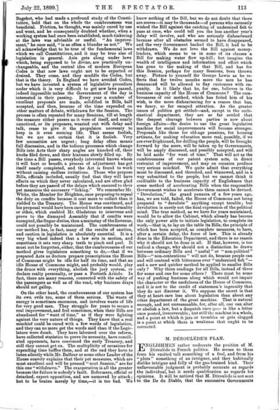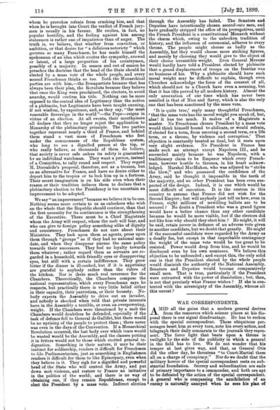M. DEROUL2DE'S PLAN.
ENGLISHMEN rather underrate the position of M. Deroulede in French politics. He seems to them from his excited talk something of a fool, and from his " plots " something of an intriguer, and they habitually dislike intrigue and folly of the gas-brained kind. Their unfavourable judgment is probably accurate as regards the individual, but it needs qualification as regards his opinions. It will be noticed that M. Deroulede is not sent to the Ile du Diable, that the successive Governments whom he provokes refrain from crushing him, and that when he is brought into Court the verdict of French jury- men is usually in his favour. He excites, in fact, no popular hostility, and the feeling against him among statesmen is rather one of impatience than of anger. The truth is, we believe, that whether from conviction, or ambition, or that desire for "a delicious notoriety" which governs so many Frenchmen, he has made himself the spokesman of an idea which excites the sympathy, avowed or latent, of a large proportion of his countrymen, possibly of a majority. In season and out of season be preaches the doctrine that the head of the State should be elected by a mass vote of the whole people, and every second Frenchman thinks so too. Both the Monarchical parties are with him,—the Bonapartists because that has always been their plan, the Royalists because they believe that once the King were proclaimed, the electors, to avoid anarchy, would confirm his title. Nothing can be more opposed to the central idea of Legitimacy than the notion of a plebiscite, but Legitimists have been taught cunning, if not wisdom, by experience, and, as they say, "the most venerable Sovereign in the world "—the Pope—reigns in virtue of an election. At all events, their mouthpieces all declare that they no longer reject the application to Monarchy of the plebiscitary principle. The two parties together represent nearly a third of France, and behind them stand a vast mass of Frenchmen who fret under the commonness of the Republican system. who long to see a dignified person at the top, or who really believe, as thousands of them do believe, that society is never safe unless its safety is guaranteed by an individual watchman. They want a person, instead of a Committee, to rally round and respect. They regard M. Deroulede's proposal, therefore, not as a treason, but as an alternative for France, and have no desire either to deport him to the tropics or to lock him up in a fortress. Their secret imagination is on his side even when their reason or their tradition induces them to declare that a plebiscitary election to the Presidency is too uncertain an improvement to be adopted.
We say "an improvement" because we believe it to be one. Nothing seems more certain to us as onlookers who wish on the whole that the Republic should continue, than that the first necessity for its continuance is the strengthening of the Executive. There must be a Chief Magistrate whom the Army will respect, whom the mob will fear, and who can give to foreign policy something alike of dignity and consistency. Frenchmen do not care about their Ministries. They look upon them as agents, press upon them through " groups " as if they had no national man- date, and when they disappear pursue the same policy towards their successors. They feel no loyalty towards them whatever ; rather regard them as servants are re- garded in a household, with friendly eyes or disapproving eyes, but still with a certain indifference. They grow bitter if the dinner is ill-cooked, but if it is appetising are grateful to anybody rather than the rulers of the kitchen. Nor is there much real reverence for the Chambers. Theoretically, the Chambers compose the national representation, which every Frenchman says he respects, but practically there is very little belief either in their capacity, their patriotism, or their honesty. No- body expects the Assembly to drive out an invader, and nobody is shocked when told that private interests have in the Assembly a terrible, or even an overpowering, weight. If the Chambers were threatened by a mob the Chambers would doubtless be defended, especially if the task of defence fell to General de Gallifet, but there would be no uprising of the people to protect them ; there never was even in the days of the Convention. If a Monarchical Revolution occurred, the last body over which tears would be wasted would be the Assembly, and the clauses putting it in fetters would not be those which excited general in- dignation. Something in their nature, it may be their instinct for soldiership, renders it difficult for Frenchmen to like Parliamentarian, just as something in Englishmen renders it difficult for them to like Episcopacy, even when they believe in it. They sigh for a dignified and powerful head of the State who will control the Army, and put down mob violence, and restore to France an initiative in the politics of the world; and there is no way of obtaining one, if they remain Republicans, except to elect the President by a mass vote. Indirect election through the Assembly has failed. The Senators and Deputies have intentionally chosen second-rate men, and have gradually stripped the office of its prerogatives, until the French President is a constitutional Monarch without the charm which, owing to the unbroken tradition of history, and the influence of ceremonial, adheres to every throne. The people might choose as badly as tho Assembly, but they would choose more striking figures, and merely by choosing they would give to the object of their choice irresistible weight. Even General Mercier would hardly have told a President elected by plebiscite that a grand displacement of troops on the frontier was no business of his. Why a plebiscite should have such moral weight may be difficult to explain, though even Churches acknowledge the force of the consent of all, which should not to a Church have even a meaning, but that it has itlis proved by all modern history. Almost the only annexation of our time which has never been assailed is that of Nice and Savoy, which is also the only one that has been sanctioned by the mass vote.
It is quite true,' reply many thoughtful Frenchmen, that the mass vote has the moral weight you speak of, but, alas! it has too much. It makes of a Magistrate a master. No Frenchman chosen President by a mass vote would think himself bound to abdicate, or would refrain, if elected for a term, from securing a second term, or a. life term, or a throne, by violence and corruption.' That objection is constantly treated as final, but it rests upon very slight evidence. No President in France has made such an attempt except Napoleon III., and he succeeded mainly because he was Napoleon, with a traditionary claim to be Emperor which every French- man, however hostile to thrones, in his heart acknow- ledged. Marshal MacMahon, who was adjured to "strike the blow," and who possessed the confidence of the Army, said he thought it impossible in the teeth of the majority, and no other President has been even sus- pected of the design. Indeed, it is one which would be most difficult of execution. It is the custom in this country to assume that France did not wish for the Second Empire ; but will anybody just tell us how, even in France, eight millions of unwilling ballots are to be secured ? No doubt a President who was a grand figure would have a better chance than any other candidate because he would be more visible, but if the electors did not like him why should they elect him ? He might, it will be said, retain power in defiance of an adverse vote given to another candidate, but we doubt that greatly. He might if the successful candidate were regarded by the Army as a deadly foe, but except in that improbable contingency the weight of the mass vote would be too great to be resisted. Power would drop from him, and he would be disobeyed even by his own nominees. We believe this objection to be unfounded ; and except this, the only solid one is that the President elected by the whole people would diminish the authority of the National Assembly. Senators and Deputies would become comparatively small men. That is true, particularly if the President were entrusted with the power of dissolution ; but, then, is not that precisely what France wishes ? If she is con- tented with the sovereignty of the Assembly, whence all this unrest ?



































 Previous page
Previous page